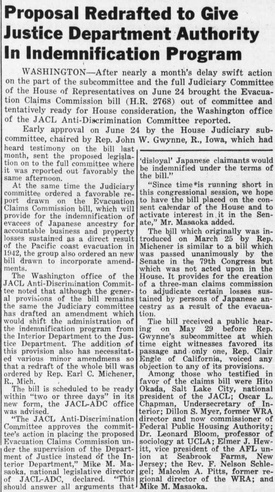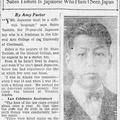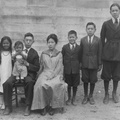During the early postwar years, Dr. Leonard Bloom, Professor of Sociology at UCLA, was able to bring together scholarship and activism into creative synthesis, most notably on the question of Evacuation Claims. In 1947, as the JACL launched its campaign for compensation for losses by West Coast Japanese Americans as a result of mass exclusion, Bloom agreed to serve as an advisor. He meanwhile launched his own study of the loss question. In collaboration with his assistant and researcher Ruth Riemer, he conducted a survey of 206 Japanese American families, most of whom were living in a trailer court in Long Beach, California, and compared their prewar and postwar economic levels.

On May 29, 1947, Bloom testified before a subcommittee of the House Judiciary Committee in regard to HR2765, a bill for awarding of Japanese Evacuation Claims. The bill would allow the attorney general to pay claims up to $2,500, with larger awards would be handled by the claims court. Bloom presented a nine-page statistical analysis with arguments support of the legislation, though he also suggested tentatively that it might be less expensive if lump-sum payments were substituted for the involved, costly claims procedure proposed in the bill. Speaking as an expert, he declared, "There can never be compensation for intangible damages, the loss of freedom, disruption of lives, and mental suffering. But the very least we can expect of a working democracy is an effort to indemnify the evacuees for economic damages suffered by no other segment of our population." Citing specific case histories, he pointed out that such losses were a direct result of official action. "The timetable and the plan of the evacuation was designed so that large economic losses were inevitable," he said.
Bloom then turned to the press. In May 1948, even as the House of Representatives was considering the final version of the Evacuation Claims bill, Bloom produced an article in Christian Century that outlined various justifications for restitution to be offered and estimating the extent of the evacuees' financial losses. He again underlined the primary responsibility of the government. "We must dispel any notions that the agencies responsible for the evacuation and for the management of the evacuees were adequately concerned with the management of evacuee property." Japanese Americans were given little advance notice of the date of removal, they were not adequately protected from unscrupulous exploiters, and the army had no well-developed plans for safeguarding evacuee property. As for the WRA, while it did take up the question of property, it was established too late to be of much assistance.
Bloom agreed that the legislation being considered was "a step in the right direction." However, he complained that it contained no provision for compensation for the loss of earned income by the internees. Not only did many evacuees lose much of what they already had at the time of exclusion, but during their time in the camps they were unable to take advantage of the booming wartime economy to find high-paying jobs. Instead, they were forced to accept jobs in camp, at salaries that Bloom termed "infinitesimal."
Bloom also argued that the government should accept less documentation of losses than might ordinarily be expected, because of the problems Japanese Americans would encounter in producing receipts. Since all Japanese Americans had clearly lost at least something, he urged the government to recognize and apply the principle of "presumptive loss" by offering a minimum blanket payment, with provision for greater awards through normal claims court practices. (The principle of offering an equal lump-sum payment, and one that would encompass intangible losses, would much later govern the redress payments offered to living former inmates under the Civil Liberties Act of 1988).
Bloom’s study of evacuation claims culminated in the book he published together with Ruth Riemer, Removal and Return: The Socio-economic Effects of the War on Japanese Americans. The book appeared in mid-1949, several months after Congress passed the Japanese Evacuation Claims Act. It is a statistical study that recounts in detail the prewar occupational status of Japanese Americans, including agriculture, fishing, produce trade, and gardening. It then covers wartime losses (including those of the Terminal Island community) and assesses criteria for treating “evacuation claims”.
Based on an estimate of prewar values, including both income and property losses, the authors concluded that Japanese Americans lost $367,486,000 as a result of mass exclusion in 1942. They underlined the durable impact of this loss on Japanese communities. "If many proponents of the evacuation were motivated by economic considerations, as is commonly assumed, their wishes have been satisfied, at least in part. Japanese Americans lost much of the economic ground they gained in more than a generation. Their holdings of rural land and urban property were greatly reduced, their financial reserves dissipated, and their occupation distribution drastically altered.” As previously, Bloom presented the book’s findings as a basis for evaluating the methods by which the government should settle claims resulting from these losses.
During this period, Bloom continued the multiyear project on Japanese American families that he had begun in 1942, and he received a Social Science Research Council Fellowship to help fund it. At some point Ruth Riemer withdrew from the project and a Nisei graduate student, John I. Kitsuse, began work on it. Meanwhile, it shifted from a large-scale statistical analysis to a more qualitative study.
The project eventually came to fruition as the 1956 book The Managed Casualty: The Japanese-American Family in World War II. After an introductory section that describes the social and cultural background of Japanese Americans and recounts the wartime events, The Managed Casualty is comprised of a series of 10 case studies of the impact over time of mass removal and confinement on selected families. It divides the progress of family life into different periods, starting with prewar life, then “pre-evacuation” period, then camp, finishing with postwar adjustments and long-term patterns.
As in Bloom’s previous work, the text of The Managed Casualty harshly criticized the policies of the WRA, most importantly for imposing a “loyalty questionnaire” on the inmates and for making the decision to close the camps before the end, throwing masses of people out without sufficient resources.
Yet by the time that The Managed Casualty was in print, its lead author had already undergone a significant evolution. First, around 1950-1951, he changed his name from Leonard Bloom to Leonard Broom. It is not clear just why he made this change, after he had reached the age of 40 and achieved a certain renown under his birth name. However, one clue may come from “Characteristics of 1,107 Petitioners for Change of Name,” a cowritten article of Broom’s that appeared a few years later in the American Sociological Review, which proposed that a large number of petitioners for name changes in the United States were Jews motivated by a desire to avoid being too easily singled out for their ethnicity.
Whatever the case, he largely ceased writing about Japanese Americans, and instead moved to a larger focus on minority and aboriginal peoples. In 1950-51 Broom spent 8 months in Jamaica and the British West Indies on a Fulbright Fellowship studying problems of urbanization and ethnic pluralism. In 1952 he spent a term at University of British Columbia. In 1953-54, he was awarded a faculty fellowship from the Ford Foundation Fund for the Advancement of Education to study the racial situation in the deep South, and the Hawaiian Islands. In 1958, he was awarded a Guggenheim Fellowship for research study in Australia.
From 1959-71, Broom was the Ashbel Smith Professor of Sociology at The University of Texas-Austin. He was brought in as chair of that department with a mandate to develop it into a major sociology department. While at Texas, he was awarded a visiting fellowship to the Center for Advanced Study in the Behavioral Sciences at Stanford (1962-1963). From 1971-1976, he was professor of sociology in the Institute of Advanced Studies at The Australian National University.
He continued to produce scholarship on a variety of groups. His 1951 book Cherokee Dance and Drama (with Frank G. Speck and Will West Long) was followed by the textbook Sociology: A Text with Adapted Readings (1955, with Phillip Selznick). This volume was one of the first sociology textbooks, and it remained a dominant text in the field for many years. Broom’s 1965 book, Transformation of the Negro American, (cowritten with Norval Glenn), was a study of civil rights and the question of equality. During his years in Australia, he was active in researching the condition of Aborigines. His 1973 book A Blanket a Year (cowritten with F. Lancaster Jones) explored the status of Aboriginal communities in Australia. In 2002 he created the Leonard Broom Scholarship to help fund Aboriginal students.
Broom ceased publishing on the subject of Japanese Americans after the mid-1950s, Although his postwar studies were republished by UC Press in the 1970s, amid renewed public interest in the wartime confinement, he seldom addressed the topic in later years. In 1962 he declared that the adjustment of Japanese Americans was “An achievement perhaps rarely equaled in the history of migration.”
In 2006 the alumni magazine at Duke University, Broom’s graduate alma mater, published a letter from an alumnus, Lewis P. Klein, Jr. defending the U.S. government’s World War II policy of mass confinement of Japanese Americans as intended, among other things, to serve wartime propaganda needs and protect Japanese Americans from physical danger. Broom, by then in his mid-90s, responded that Roosevelt’s “execrable” Executive Order was not issued to help or protect Japanese Americans: “[D]espite the press campaign against Japanese Americans, there were few overt acts against them, perhaps equal to the number of expressions of personal sympathy. Certainly the camps were not established to provide protective custody. Nor were they designed for family life. I saw them….It is now generally accepted that the evacuation was unjustified, that it impaired the war effort, and that it harmed loyal Americans.”
Leonard Broom died in November 2009, just days after his 98thbirthday. His work on Japanese Americans, both scholarly and popular, deserves more public attention.
© 2020 Greg Robinson





